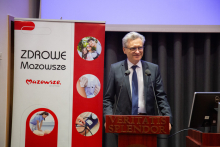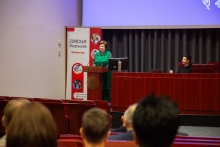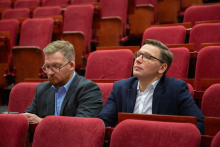Education is key
Education was the foundation of the campaign. A training cycle was organized, dedicated to medical personnel (doctors, nurses, transplantation coordinators) and students of post-secondary schools. These have fostered growth of organ transplantation awareness. The campaign further included workshops with a psychologist and with actors, so that the trainees could acquire new competences in talking to potential donors’ families.
Not enough organs for transplanting
– All measures in favor of improving the situation of transplant surgeons in the Mazovia region are extremely helpful. Mainly because the number of patients in need of an organ transplant absolutely does not match the number of potential donors – says prof. Sławomir Nazarewski, Provincial Consultant in Transplantation Medicine, head of the General Surgery, Vascular Surgery and Transplantation Surgery Clinical Department at UCK WUM, adding that there are 55 hospitals with so-called donation potential in Mazowieckie province. Of this number, 20-30 hospitals have been active in the field of transplantation throughout the recent years.
At the moment, there are 5348 persons registered in the National Transplant Waiting List. By November 27, 2023, 685 donors were reported to “POLTRASPLANT” Management and Coordination Center, of whom there were 520 actual donors, and 1645 organs were procured and transplanted from them. Hence, the shortages are enormous.
What is the core of the problem
– When we ask the question why so few organs are being procured in Poland, the most frequent reply we hear is that people refuse to give their consent. Yet the number of organ donation refusals registered in the central registry of refusals is not growing. Also when we talk to families of patients who were declared brain dead, only 10% of them refuse to agree to organ procurement. And this proportion is fixed in Poland – prof. Maciej Kosieradzki says. – Unfortunately, the problem is often that certain soft skills, which are used in communication with patients’ families or with very sick people, are not taught during our studies, nor do we learn them after starting work. Therefore, phase one of the program was dedicated to neurologists, neurosurgeons or anesthesiologists, so that these skills could be taught to them and so that they were able to practice the difficult conversation in a safe environment, with actors and a psychologist.
The “Give Life” campaign was a part of the “Organ Donation and Organ Transplantation Development Program”, partially funded by the Local Government of Mazowieckie Province.
Conference participants
Prof. Zbigniew Gaciong, Rector of WUM; Elżbieta Lanc, Member of Mazowieckie Province Management; Marzena Cendrowska, deputy director of the Department of Health and Social Policy at the Mazowieckie Province Marshal’s Office; prof. Maciej Kosieradzki, head of WUM Institute and Clinical Department of General Surgery and Transplantation Surgery, president of the Polish Transplantation Society; prof. Roman Danielewicz, WUM Department of Surgical, Transplantation and Extracorporeal Treatment Nursing; prof. Sławomir Nazarewski, UCK WUM Institute and Clinical Department of General Surgery, Vascular Surgery, Endocrine Surgery and Transplantation Surgery; Anna Bilińska and Piotr Biliński, kidney donor and recipient; Monika Trujnara, MD, anesthesiologist and transplantation coordinator at Międzylesie Specialist Hospital.



